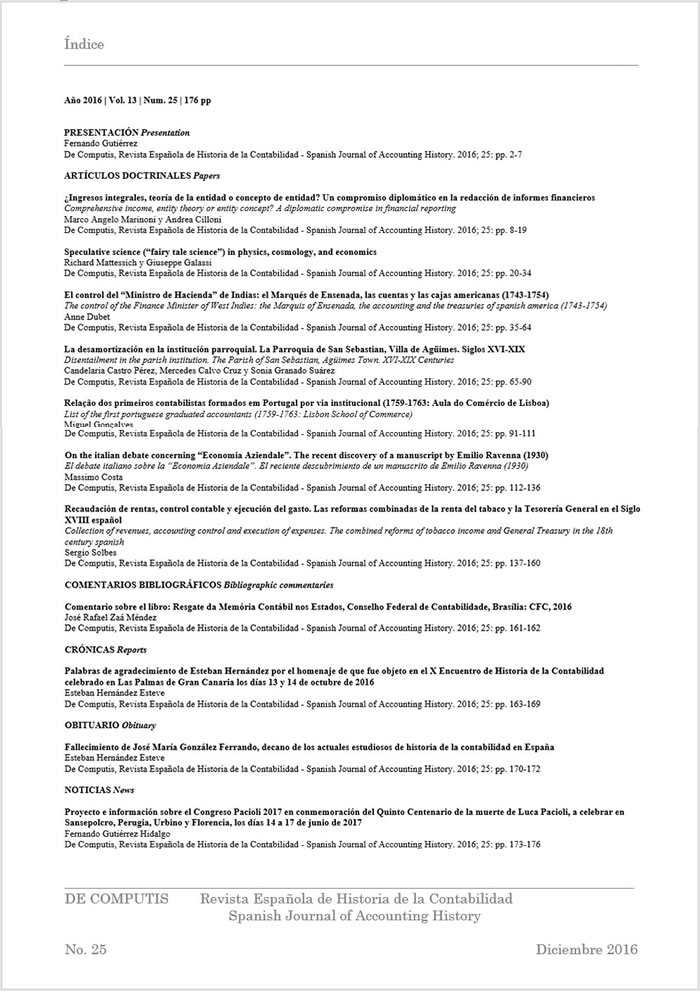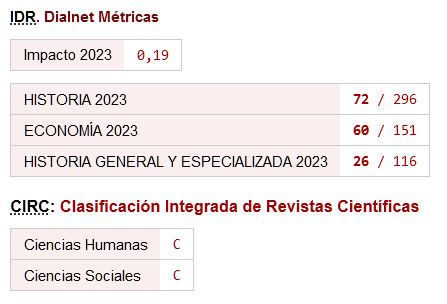Speculative science ("fairy tale science") in physics, cosmology, and economics
DOI:
https://doi.org/10.26784/issn.1886-1881.v13i25.251Palabras clave:
Reality, Mathematical consistency vs. empirical evidence in physics, Cosmology, Economics and financeResumen
The paper juxtaposes two recent books dealing with reality issues in a broad sense. The first of these, by Baggott (2013,) examines and criticizes the historically increasing trend to base scientific conclusions on mathematical hypotheses and logical consistency rather than on empirical evidence -- Bagott calls this trend “fairy tale science”. The second book, Tegmark (2014),i defends the opposite view – it considers Mathematics as identical to Reality and promotes increasing reliance of modern physics and cosmology on mathematical assumptions and logical consistencies rather than empirical evidence -- defending such controversial conclusions that we live in one of infinitely many parallel universes with numerous alter egos of each of us. But this is not a book review of Baggott (2013) and Tegmark (2014); its aim is to draw attention to the fact that social scientists are not the only scholars blamed for paying too much attention to model building and too little to empirical confirmation. This, ought to be of enormous interest to financial scholars; it may even be a consolation to some of them for emphasizing mathematical consistency rather than empirical confirmation. But our examples (from “speculative science” in finance) illustrate that such a trend caused staggering losses during the financial crisis of 1997-1998 (of Japan and Russia) and serious threats to the entire World Economic System during the crisis of 2007-2008
Descargas
Citas
Baggott, J. (2005) Beginner's guide to reality.Penguin, London.
Baggott, J. (2011) The quantum story: a history in 40 moments. Oxford University Press, Oxford.
Baggott, J. (2012) Higgs: the invention and discovery of the 'God Particle'. Oxford University Press, Oxford.
Baggott, J. (2013) Farewell to reality: how modern physics has betrayed the searchfor scientific truth. Pegasus Books, Kindle Edition.
Black, F. Scholes, M. (1973) "The pricing of options and corporate liabilities". Journal of Political Economy81 (3): 637-654.
https://doi.org/10.1086/260062
CERN (n.d.) The Higgs boson CERN n.d.: http://home.web.cern.ch/topics/higgs-boson
Everett, H. (1957) The many-worlds interpretation of quantum mechanics. Ph.D. diss., Princeton University, 1957. Free download at
Greene, B. (2003) The elegant universe. W. W. Norton and Company, New York.
Greene, B. (2004) The fabric of the Cosmos.Knopf, New York.
Greene, B. (2011) The hidden reality. Knopf, New York.
Guth, A. (1997) The inflationary universe. Perseus Books Group,New York.
Linde, A. (1990) Particle physics and inflationary cosmology.Harwood Academic Publishers, Chur, Switzerland.
https://doi.org/10.1201/9780367807788
Mattessich, R. (2014) Reality and accounting: ontological explorations in the economic and social sciences. Routledge, London, New York.
https://doi.org/10.4324/9780203798737
Mattessich, R., Galassi, G. (2015) "On the interdependence of basic concepts: substance and space, time and change, and consciousness".Process Studies Supplement20: 1-17.
Merton, R. (1973) "Theory of rational option pricing". Bell Journal of Economicsand Management Science4 (1): 141-183.
https://doi.org/10.2307/3003143
Salmon, F. (2009) "Receipt for disaster: the formula that killed Wall Street".Wired Magazine 17.03 (2009)
Susskind, L. (2005) Thecosmic landscape: string theory and the illusion of intelligentdesign.Little, Brown and Company, New York.
Tegmark, M. (2014a) Our mathematical universe - My quest for the ultimatenature of reality. Knopf, New York.
Tegmark, M. (Jan. 10, 2014b) "Is the universe made of math?" - [Excerpt].Scientific American
Vilenkin, A. (2006) Many worlds in one:the search for other universes.Hill and Wang, New York.
Weinberg, S. (1993) The first three minutes: a modern view of the origin of the universe.BasicBooks, New York.
Weinberg, S. (1992) Dreams of a final theory: the scientist's search for the ultimate laws of nature. Pantheon, New York.
Wikipedia (2015a, last modified May) Eternalism (Philosophy of time)
Wikipedia (2015b, last modified August) Long-term capital management
Descargas
Publicado
Cómo citar
Número
Sección
Licencia

Esta obra está bajo una licencia internacional Creative Commons Atribución-NoComercial-CompartirIgual 4.0.










